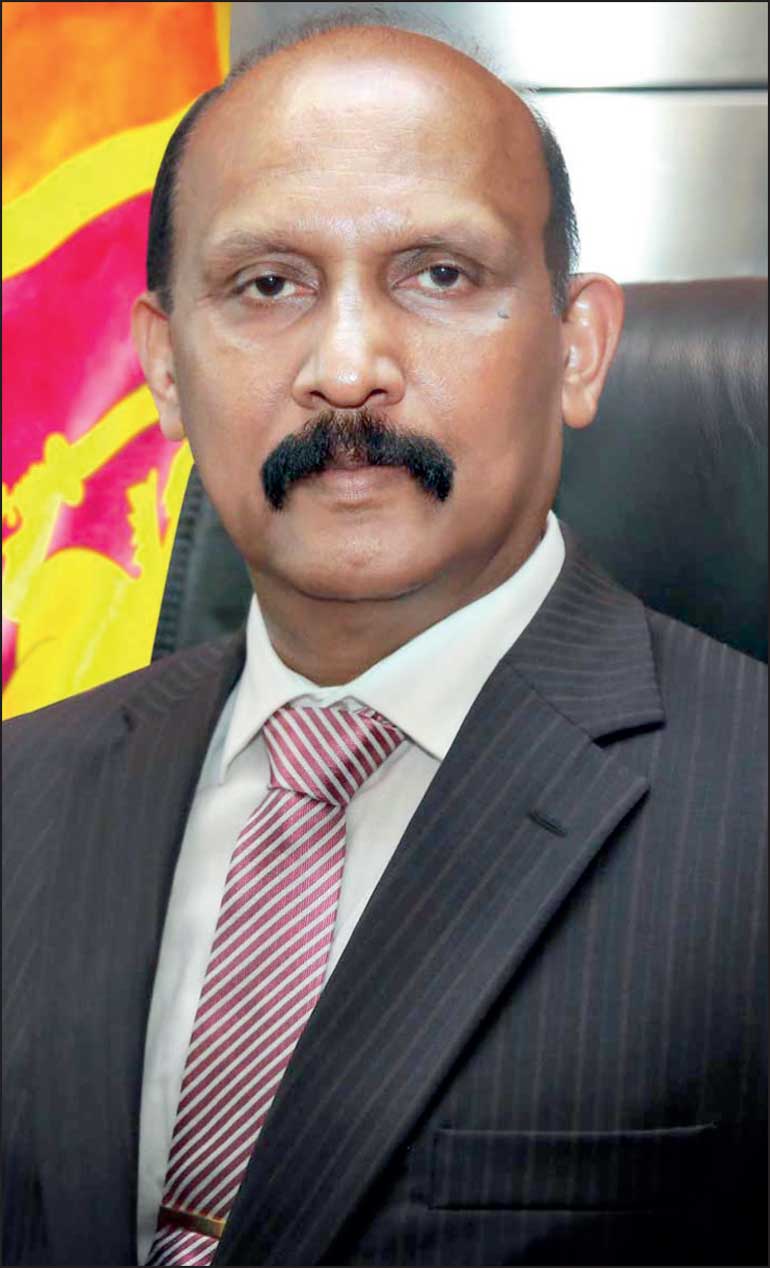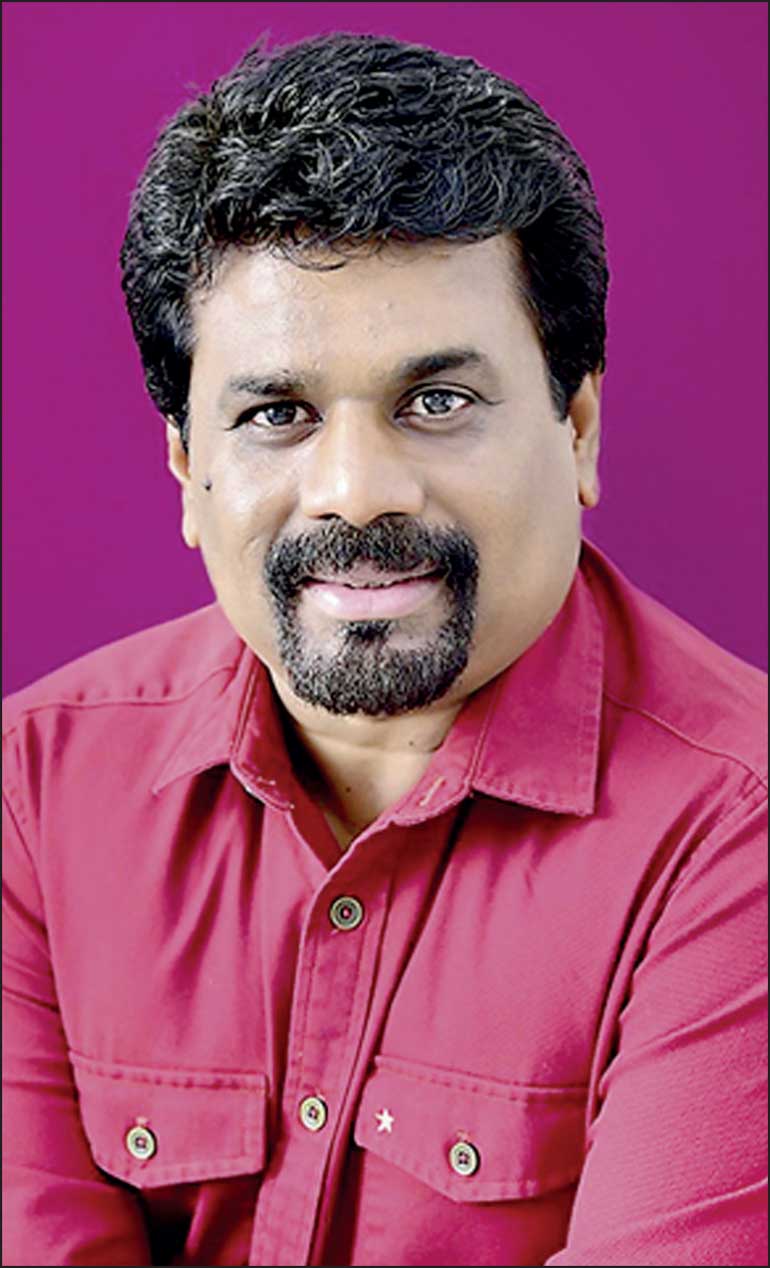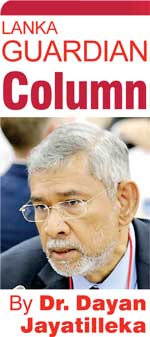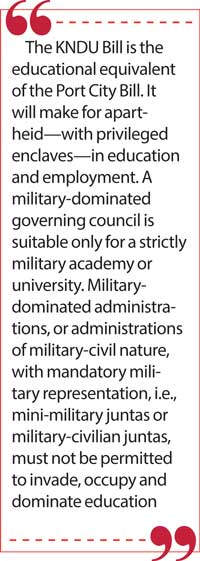Thursday Feb 26, 2026
Thursday Feb 26, 2026
Thursday, 5 August 2021 00:12 - - {{hitsCtrl.values.hits}}

Secretary to the Ministry of Defence Gen. Kamal Gunaratne should seek a briefing from Lalith Weeratunga before speaking cavalierly on subjects outside his scope

Sri Lanka’s liberal democracy is under challenge. The primary challenge comes from the regime. A secondary challenge comes from JVP Leader Anura Kumara Dissanayake
While there has been a dramatic improvement in the vaccine rollout since supplies increased, the best practice globally is quasi-normalisation though opening up after at least 50% of the citizenry have been re-vaccinated. Violation of that norm would open Sri Lanka wide to a fourth wave, of the deadly Delta variant. The damage caused by the Government’s uncalibrated opening-up is overtaking the good done by accelerated vaccination.
re-vaccinated. Violation of that norm would open Sri Lanka wide to a fourth wave, of the deadly Delta variant. The damage caused by the Government’s uncalibrated opening-up is overtaking the good done by accelerated vaccination.
Military-civil juntas in education?
The KNDU Bill is the educational equivalent of the Port City Bill. It will make for apartheid—with privileged enclaves—in education and employment.
A military-dominated governing council is suitable only for a strictly military academy or university. Military-dominated administrations, or administrations of military-civil nature, with mandatory military representation, i.e., mini-military juntas or military-civilian juntas, must not be permitted to invade, occupy and dominate education.
The Government’s decision not to neutralise the largest component of the combined protest movement, namely the teachers and principals, by a compromise which would meet their demands partway, tells us that:
(1) The regime is no longer a strategically rational actor, if it ever was.
(2) The non-rational, confrontational fraction of the regime is dominant, while the old practitioners and practices of cooptation through negotiation (the MR-mode) are eclipsed.
(3) The regime has no financial capacity to meet rising social demands and accommodate social sectors. It may therefore turn to repression as its only option.
Dramatic and consequential as the student-teacher-school principals’ protest movement covering the entire educational sphere is, a looming issue which is as wide if not wider, and socially deeper, is that of the peasantry which is in despair as their crops are damaged and close to failure because of the shock deprivation of pesticide, weedicide and fertiliser.
The regime’s attitude to the collective opinion of agriculturalists, soil scientists and agronomists against the rapid nationwide conversion to organic agriculture is similar to its attitude to the Association of Medical Specialists’ red alert about uncalibrated opening-up and a COVID-19 catastrophe. Sri Lanka is sitting on a social volcano.
Medical Specialists’ red alert about uncalibrated opening-up and a COVID-19 catastrophe. Sri Lanka is sitting on a social volcano.
When at a time of protest and polarisation, a President with a military background, proceeds in a ceremonial motorcade to the Army Headquarters for something other than an occasion in the national military calendar (the only event was the presentation of a book on the history of the Air Mobile brigade, once commanded by Gen Kamal Gunaratne), it gets my attention. President GR was touching base.
When the President is the only Sri Lankan leader, and perhaps the only world leader to repeatedly express to President Xi, his eagerness to “learn” the “governance experience” of the Communist Party of China, and when that “governance experience” includes the tragic Tiananmen crackdown of 1989, I worry.
Meanwhile, Ven. Galagodatte Gnanasara and the BBS came out strongly in favour of the KNDU Bill and urge a determined drive by the President to ram it through. The unprovoked postwar pandemic of Islamophobia (around 2012) and the term ‘handlers’ come to mind.
Manchurian candidates
Call it the Sinicisation of the Sinhala mind, through the self-Sinicisation of the Sri Lankan military mind. The dangers of the type of education that will be imparted if the KNDU Bill goes through are best evidenced in an interview given by Gen. Kamal Gunaratne, Secretary to the Ministry of Defence and published in this newspaper.
The interview was conducted by Chinese Chamber of Commerce in Sri Lanka Chief Media Officer Amy Yang on the first anniversary of the Sri Lanka chapter of the Alumni of China’s National Defence University (NDU). The Lankan chapter was founded by Gen. Gunaratne. Here is a quote from the interview, in which (through no fault of the Chinese interviewer) Gen. Kamal Gunaratne engages in outright falsification of history.
“When we were challenged by the United Nations Human Rights Council (UNHRC) on ‘war crimes’ and ‘crimes against humanity,’ China supported us by exercising the veto power against the UNHRC Resolution against Sri Lanka, which will never be forgotten even by our future generation.” (May the long-lasting friendship bear new fruits: Defence Secy. | Daily FT – https://www.ft.lk/opinion/May-the-long-lasting-friendship-bear-new-fruits-Defence-Secy/14-721082)
The Sinicisation of the Sinhala power-elite has proceeded to such a pronounced extent that an achievement of Sri Lanka and Sri Lankans, which (as in the case of the war) includes the securing of assistance from friends, is now attributed by this top official, to China.
If as Gen. Gunaratne says, “China supported us by exercising the veto power against the UNHRC Resolution against Sri Lanka,” how could Sri Lanka have lost the vote at the UNHRC in 2012, 2013, 2014 and this year, 2021?
This is no fault of China. Contrary to Gen. Gunaratne’s flattering account, China couldn’t “support us by exercising the veto power against the UNHRC resolution against Sri Lanka” because there is no veto power at the United Nations Human Rights Council (UNHRC).
There is, at the UN Security Council (UNSC) though, but there was never any ‘resolution against Sri Lanka’ on ‘war crimes and crimes against humanity’ in New York because of an assured Russian and Chinese veto. Geneva was the only access-route and battlefield.
China, like India, Pakistan, Russia, Cuba and the Nonaligned Movement, was a member of the strong coalition amounting to a near two-thirds of the UNHRC’s member-states, that Sri Lanka assembled at the UNHRC on the occasion that Gen. Gunaratne speaks of as one which “will never be forgotten even by our future generation”. China supported Sri Lanka robustly during the war, as it did diplomatically at the UN, but just as the war was fought and won by the Sri Lankans (of whom Gen. Gunaratne was a frontline commander), so too was the diplomatic battle at the UNHRC, a week after Nandikadal. 
I was an elected Vice-President of the UN Human Rights Council and Ambassador/Permanent Representative of Sri Lanka covering the final years of the last war culminating in the decisive diplomatic “challenge” that Gen. Gunaratne waxes so eloquently about. The only time Sri Lanka won in Geneva—where no veto is granted to any country—was on my watch. It lost four times since then (after my time).
Gen. Gunaratne’s version is the equivalent of saying that China, which assisted our war effort (and it did), delivered victory by dropping a bomb on the LTTE at Nandikadal (which it didn’t).
Since the entire international community knows what happened at the UNHRC in May 2009, Sri Lanka’s Secretary/MoD shouldn’t get his facts wrong. Getting them right would be easy. The scholarly research literature published internationally on the subject of the UNHRC May 2009 over the decade that followed, seems at last glance, greater in volume than the international scholarly output on any other Sri Lankan/Sri Lanka-related event of the year 2009. (Sri Lanka in Geneva May 2009: International Scholarly Assessments & Interpretations – Colombo Telegraph – https://www.colombotelegraph.com/index.php/sri-lanka-in-geneva-may-2009-international-scholarly-assessments-interpretations/)
What must “never be forgotten even by our future generation” is the factual historical truth. A Chinese veto would have meant that the challenge to Sri Lanka was deterred or stopped in its tracks and we were saved from having to battle. What actually happened was that the challenge came—there was no veto possible, to stop it—and Sri Lanka won.
If the KDU proliferation takes hold, doubtless Gen. Gunaratne’s imaginary version of Sri Lanka’s diplomatic history at the UNHRC would be imparted, so that it “will never be forgotten even by our future generation”.
If this false version of diplomatic history is repeated by a lecturer (who may believe it because he/she read Gen. Gunaratne’s interview), and any student who has read up on the subject questions it, that student will be found guilty of “disobedience or disrespecting or arguing unnecessarily with lecturers” as per the KDU rulebook.
No wonder the best-educated stratum of our society, i.e., the community of university academics as a totality, is utterly horrified by the implications of the KNDU Bill for the ethos and substance of higher education and the training of the mind of “our future generation”.
No wonder the regime cannot manage Geneva and suffers grave defeat. It cannot understand what went on there. Its topmost defence official doesn’t even know what happened.
An official can have his/her opinions on any matter, or be forgiven for being ignorant of a subject, but he/she should not place on the public record his/her wildly unfounded version of the facts of history while utterly ignorant of them. As Mao Zedong said “no investigation, no right to speak”. Gen. Kamal Gunaratne should seek a briefing from Lalith Weeratunga before speaking cavalierly on subjects outside his scope.
Liberal democracy besieged
Sri Lanka’s liberal democracy is under challenge. The primary challenge comes from the regime, with its hyper-presidency, militarisation, militarism, polarising policies and truculent obduracy.
A secondary, potential or latent challenge came, more by omission than commission, from JVP Leader Anura Kumara Dissanayake, seen on the 10 p.m. Sirasa News of 1 August asserting at a landmark media briefing at the Solis Hall, Kotte, that (1) the NPP was putting itself forward as ready, willing and able to assume power and (2) the NPP was the main alternative force aspiring to lead the country.
Throwing the JVP-driven front organisation’s hat in the ring is completely fair and legitimate though typically premature, hubristic and more than a reach, but what makes JVP Leader AKD’s declaration slightly worrisome is the Sherlock Holmesian principle of the dog that didn’t bark: (A) He refrained from using the magic words “through a peaceful electoral process” and (B) Has so far failed to express repentance about the JVP’s widespread use of barbaric violence during its second insurrection. No moral-ethical vaccination; no firewalls, guardrails or guarantees against extra-constitutionality.
Liberal democracy in Sri Lanka has to be rescued from these twin dangers, but as prerequisite it must undergo a political audit and a re-set.
Self-proclaimed Lankan advocates of liberal democracy do not distinguish between its different meanings.
Firstly, liberal democracy exists as a political order; a system. Even though Boris Johnson is no liberal democrat, the UK is a liberal democracy.
Secondly, liberal democracy is an ideology. Sometimes liberal democracies have
governments/leaderships with a liberal democratic ideology, sometimes not.
There are often situations in history where a liberal democratic political order has been best served and saved, not by a liberal democratic government or leader but by a variant.
What Lankan liberal democrats (‘lib-dems’) term ‘liberal’ is valued by them more than ‘democracy’. In their limited world view, the only democrats are liberals and the only liberals are the ones who tick all the boxes of their preferences and predilections.
President Premadasa who literally saved a fundamentally liberal democratic system and a market economy from a ferociously violent rampage by a totalitarian left, was attacked by lib-dems (e.g., Mangala Samaraweera, Dr. Saravanamuttu). However, the most literate, Dr. Chanaka Amaratunga and Prof. Rajiva Wijesinha, supported him.
The litmus test that Lankan lib-dems apply is the economic one, not the commitment to liberal democracy as a political system.
Had they grasped President FDR’s Four Freedoms, they would have embraced a socioeconomically more equitable and progressive liberalism. Instead, they preferred the economic theories of those who were far from liberal democrats themselves, ranging from Hayek to Milton Friedman. The latter and his acolytes applauded and advised the regime of the most notorious military dictator of our lifetime, Chile’s General Augusto Pinochet.
Lankan lib-dem politicians were/are not adherents of progressive liberals such as Nobel Prize-winners Joe Stiglitz and Paul Krugman, or Robert Reich and Jeff Sachs, nor fans of Barack Obama, but rather, of Thatcher, Reagan and Bush. Lib-dem ideologues remain Hillary Clinton supporters rather than Obama, Kerry, Sanders and Biden ones. They are silent about the progressive neo-FDR spending packages of President Biden which fired-up the US economy.
Lankan lib-dems stood dogmatically for a negotiated solution with the Tigers and consistently opposed the war. They never supported the implementation of the 13th Amendment.
Their appeasing, pacifist stand violated the basis of the Social Contract by which the state is tasked with providing physical security from violent foes. US liberal democrats understand that responsibility. Barack Obama, not George Bush, took out Osama Bin Laden.
Pacifist appeasement violated the basic function of the state to protect its unity, territorial integrity and sovereignty from those who would sunder them. Lankan lib-dems were no followers of Lincoln.
President Kumaratunga’s Deputy Defence Minister Anuruddha Ratwatte complained bitterly about Minister Mangala Samaraweera’s anti-war Sudu Nelum (‘White Lotus’) Movement continuing even after the LTTE had returned to war unilaterally in April 1995. Sudu Nelum slashed recruitment among Sinhala youths to the all-volunteer army. Thus, CBK remained deprived of the option of victory and a progressive peace, even after she liberated Jaffna.
Concerned though they rightly are about the manifest Sino-centrism of Lankan foreign policy, Lankan lib-dems never applaud the successful tripolar balancing (USA-India-China) by our greatest foreign minister Lakshman Kadirgamar. Instead, they support the foreign policy of Ranil Wickremesinghe and Minister Mangala Samaraweera, whose UNHRC Geneva (‘foreign judges’) resolution 30/1, was an engine powering the Gotabaya presidential run.
Saving liberal democracy
The problem with Lankan lib-dems is not that they are too pro-American, but that they aren’t (intellectually) Americanised enough. They equate liberal democracy with the parliamentary system and dictatorship with the presidential system.
The regime’s Sinophilia cannot be countered with (Sinophobic) Anglophilia. This isn’t Hong Kong. Lanka’s lib-dem elite is Westernised only in terms of contacts, funding sources, and knee-jerk foreign policy. Intellectually, not so much. Would Barack Obama have ever led the USA if not for the presidency? The most doable democratic reset of Sri Lanka’s political system would be to a US or French presidentialism, but the lid-dems are unattracted by American (North and South) and Continental political ideas, models and experiences.
The pioneering ultranationalist oppressor and war-monger of our time, Benjamin Netanyahu, was Prime Minister, not President. One of the most respected, incorruptible and ethical leaders of our time was Uruguay’s President Mujica.
A leading figure of the urban guerrilla movement, the MLN-Tupamaros, during the civilian-military junta of an elected President, Mujica was detained for years at the bottom of a disused horse-watering trough, described as a well. Decades later, having been a Senator and a Minister, Mujica won the Presidency. The only change in the presidency was tightening of term-limits.
Lankan lib-dems have confused populism and nationalism with autocracy. That’s richly ironic because in many countries, autocrats have been defeated by democrats who are also populists and/or nationalists to some degree (e.g., Mexico’s Lopez Obrador). Recently, the rightwing authoritarian candidacy of Peruvian ex-President Fujimori’s daughter Keiko Fujimori, was defeated by Pedro Castillo, a left-populist.
Lankan lib-dems pushed Sri Lankan liberal democracy’s back to the wall, shrinking its social support. The crisis is changing things and the Lankan Trump-Bolsonaro equivalent’s popularity is decomposing. However, as in the historic, successful struggle against Trump and Trumpism, the needle won’t go all the way back (Hillary) nor all the way forward (Bernie). Progressive centrism (Biden) is where the needle settles.